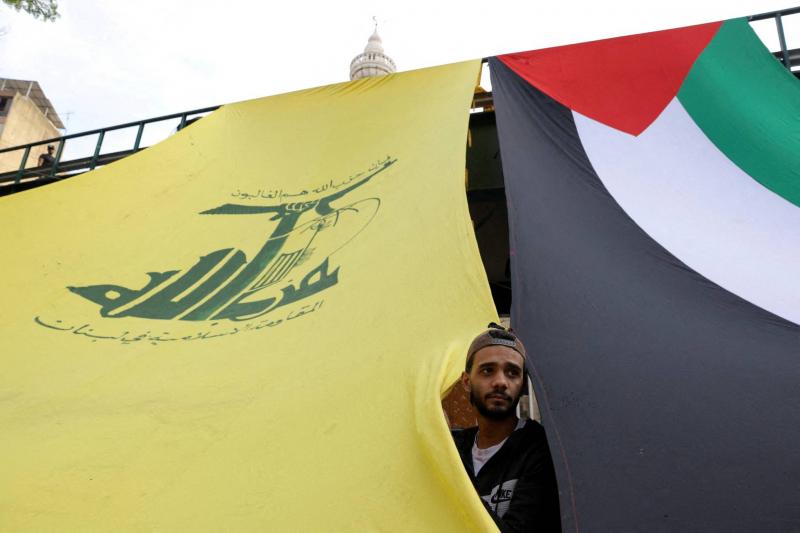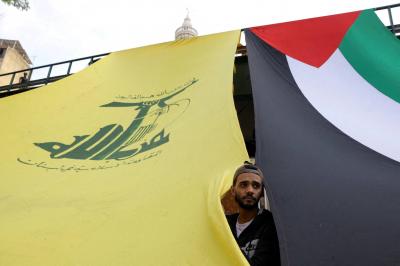Informed sources regarding the steps taken by Hezbollah in its recent battle have indicated that it is paying an increasing price in an ongoing fight with Israel, which has lasted for weeks and resulted in the death of over 100 of its fighters. However, it does not anticipate a full-scale war even with the rising death toll and the continuing conflict. The Iranian-backed Lebanese group buried six more of its fighters today, Wednesday, their coffins wrapped in the group's yellow flag. These are the latest casualties in the fiercest confrontation with Israel since the 2006 war.
Hezbollah exchanged gunfire with Israel along the border since the attack by the Islamic resistance movement (Hamas), but the violence has largely subsided in areas along the border, which observers described as unwritten rules of engagement between adversaries who have long threatened each other with catastrophic consequences in the event of war. Sheikh Youssef Sarour, an official in Hezbollah, said during the funeral in the southern suburbs of Beirut controlled by Hezbollah that the group has "pledged to support the Gaza front... in order to relieve it as much as possible." He added to Reuters that Hezbollah is acting in a way that "does not explode (the situation) generally, while at the same time making Israel feel that there is a serious party supporting those oppressed in Gaza."
One informed source on Hezbollah's thinking, who spoke on the condition of anonymity due to the sensitivity of the matter, stated, "The rules still exist between Hezbollah and Israel." Two other sources reiterated this assessment. The source continued, "What are these rules? First, civilian neutrality. When the Israelis make a mistake and kill a civilian, Hezbollah retaliates in a way aimed at killing a civilian. When Israel approaches the depth a little, Hezbollah deepens its bombardment, and here the matter stops."
The Israeli army declined to respond to Reuters' questions regarding this report. Nabil Bou Minsif, deputy editor of the Lebanese newspaper An-Nahar, stated that "the southern front is governed by unannounced rules of engagement, but with any breaking mistake, things could spiral out of control and head towards full-scale war." Israel has asserted that it does not seek to open a front in the north. Prime Minister Benjamin Netanyahu warned that Beirut would turn "into Gaza" if Hezbollah started a full-scale war.
However, with more than 80,000 Israelis fleeing towns and villages in the north, Israel has also stated that it wants to push Hezbollah away from the border in line with a United Nations resolution that ended the 2006 war. Israeli Defense Minister Yoav Gallant said on December 18, "We will return residents of the north to their homes on the border after restoring full security. We prefer to do this through understanding and ensuring that the border area is free of terrorists and does not allow direct threats to our citizens." He added, "If such an operation is not carried out diplomatically, we will not hesitate to act."
Tens of thousands of Lebanese have fled the border area. The U.S. does not want a wider war. U.S. Defense Secretary Lloyd Austin, standing alongside Gallant, stated that the United States does not want to see the conflict escalate into "a larger war or a regional war." Austin added, "We demand that Hezbollah ensure it does not do anything that could ignite a wider conflict."
Hezbollah buried more bodies today, Wednesday, in villages just a few meters from the Israeli border. Hezbollah fighters gathered in combat uniforms around the coffins in scenes that were unimaginable when the adversaries were waging a full-scale war in 2006. The party's Al-Manar television broadcast the funerals. Hezbollah lost 269 fighters in the 2006 conflict. The intensity of attacks has fluctuated. Violence completely halted during the week-long ceasefire in Gaza and resumed after the truce ended.
On December 10, one of the worst days so far, Hezbollah launched drones and powerful "Burkan" missiles at Israeli positions, while Israeli airstrikes rocked southern Lebanon, destroying five homes in one town. Hezbollah claims that the flight of Israelis from the area is an achievement of its campaign and that its attacks have occupied the Israeli army on a second front while the war in Gaza continues. In Lebanon, about 18 civilians have died. In Israel, the fighting has resulted in the deaths of at least seven soldiers and four civilians. Among Hezbollah's casualties were members of the elite Radwan unit. The informed source on Hezbollah's thinking noted that the conflict was a live maneuver for the group, providing lessons for any future war, but at a price.




